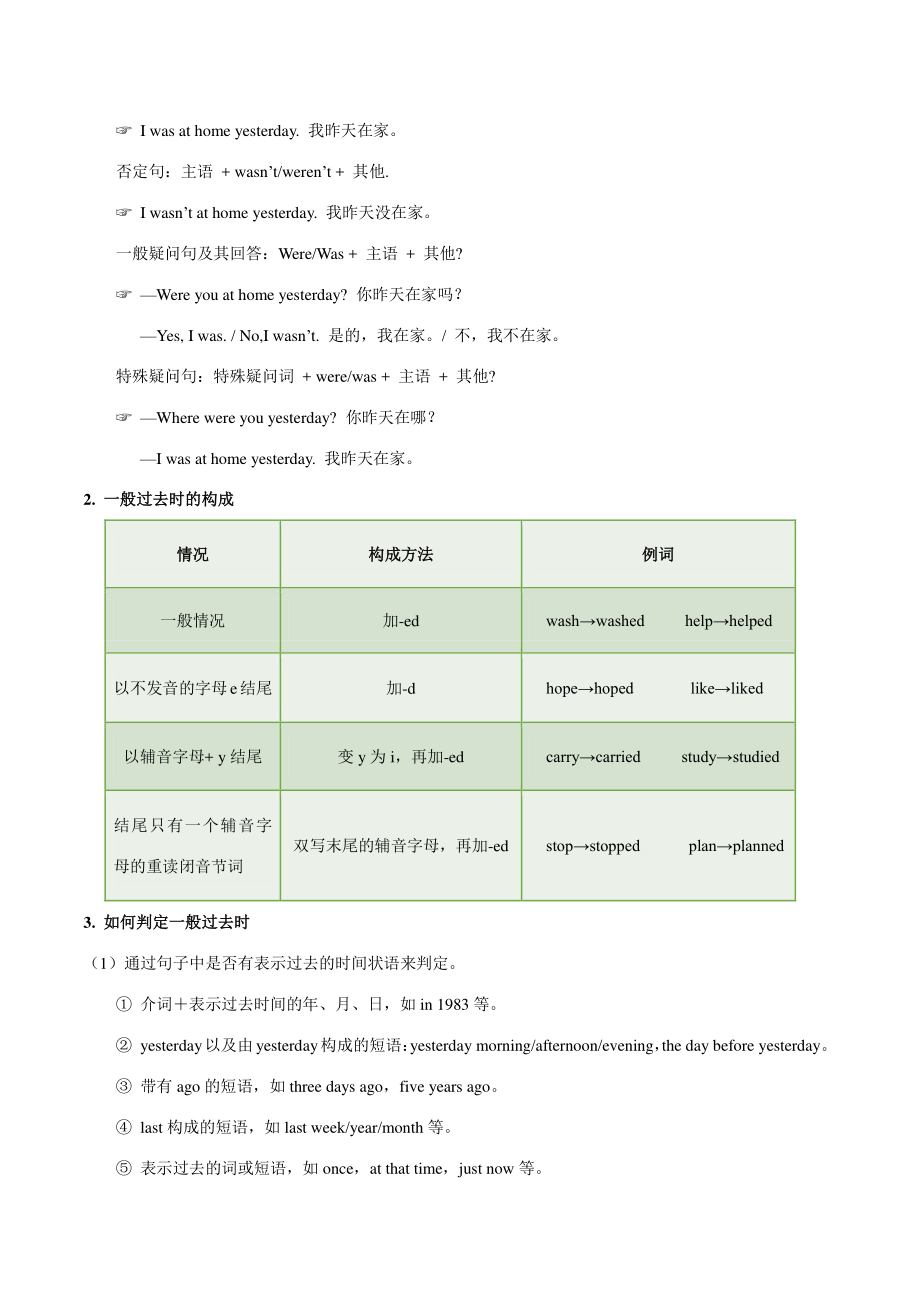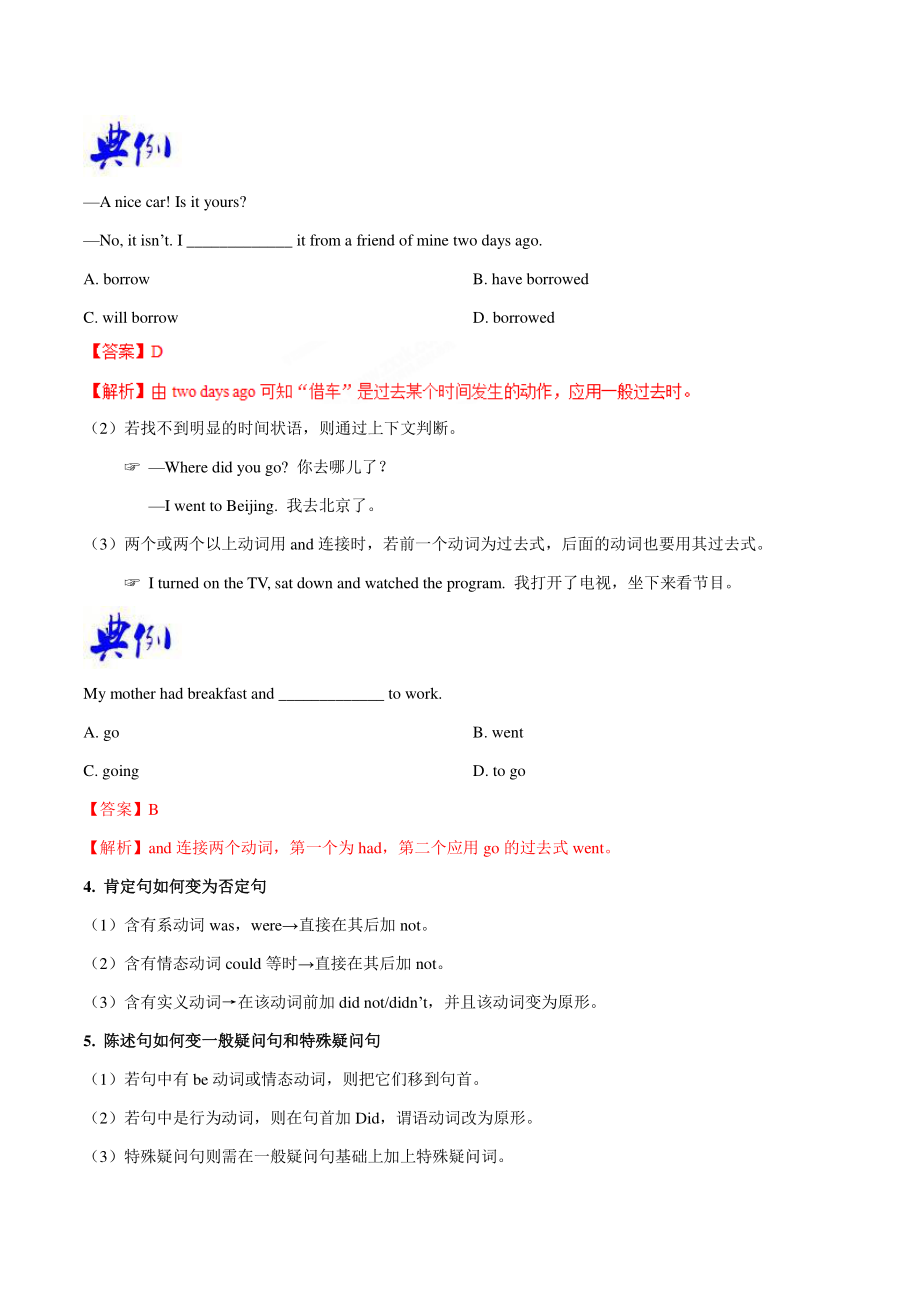 人教版八年级英语上册Unit1 Grammar培优讲义(含答案)
人教版八年级英语上册Unit1 Grammar培优讲义(含答案)
《人教版八年级英语上册Unit1 Grammar培优讲义(含答案)》由会员分享,可在线阅读,更多相关《人教版八年级英语上册Unit1 Grammar培优讲义(含答案)(15页珍藏版)》请在七七文库上搜索。
1、 Unit1 Grammar (一)一般过去时(一)一般过去时 一般过去时表示过去某个时间发生的动作或存在的状态,也表示过去经常或反复发生的动作。其结 构为: a. 主系表 主语was/were其他. b. 主谓宾 主语谓语动词(过去式)宾语. What did you do yesterday? 昨天你做了什么? I went swimming. 我去游泳了。 When I was at middle school, I often went to school by bike. 我读中学时经常骑自行车去学校。 1. 一般过去时的基本结构一般过去时的基本结构 实义动词 肯定句:主语 + 动词
2、过去式 + 其他. I went to the cinema yesterday. 我昨天看了电影。 否定句:主语 + didnt + 动词原形 + 其他。 I didnt go to the cinema yesterday. 我昨天没看电影。 一般疑问句及其回答:Did + 主语 + 动词原形 + 其他? 肯定回答:Yes, 主语 + did. 否定回答:No, 主语 + didnt / did not. Did you go to the cinema yesterday? 你昨天去看电影了吗? Yes, I did./No, I didnt. 是的,我去了。/ 不,我没去。 特殊疑问句
3、:特殊疑问词+did+主语+动词原形+其他? Where did you go yesterday? 你昨天去哪儿了? I went to the cinema yesterday. 我昨天去看电影了。 be 动词 肯定句:主语 + was/were + 其他. I was at home yesterday. 我昨天在家。 否定句:主语 + wasnt/werent + 其他. I wasnt at home yesterday. 我昨天没在家。 一般疑问句及其回答:Were/Was + 主语 + 其他? Were you at home yesterday? 你昨天在家吗? Yes, I
4、was. / No,I wasnt. 是的,我在家。/ 不,我不在家。 特殊疑问句:特殊疑问词 + were/was + 主语 + 其他? Where were you yesterday? 你昨天在哪? I was at home yesterday. 我昨天在家。 2. 一般过去时的构成一般过去时的构成 情况情况 构成方法构成方法 例词例词 一般情况 加-ed washwashed helphelped 以不发音的字母e结尾 加-d hopehoped likeliked 以辅音字母+ y 结尾 变 y 为 i,再加-ed carrycarried studystudied 结尾只有一个辅
5、音字 母的重读闭音节词 双写末尾的辅音字母,再加-ed stopstopped planplanned 3. 如何判定一般过去时如何判定一般过去时 (1)通过句子中是否有表示过去的时间状语来判定。 介词表示过去时间的年、月、日,如 in 1983 等。 yesterday以及由yesterday构成的短语: yesterday morning/afternoon/evening, the day before yesterday。 带有 ago 的短语,如 three days ago,five years ago。 last 构成的短语,如 last week/year/month 等。 表
6、示过去的词或短语,如 once,at that time,just now 等。 A nice car! Is it yours? No, it isnt. I _ it from a friend of mine two days ago. A. borrow B. have borrowed C. will borrow D. borrowed (2)若找不到明显的时间状语,则通过上下文判断。 Where did you go? 你去哪儿了? I went to Beijing. 我去北京了。 (3)两个或两个以上动词用 and 连接时,若前一个动词为过去式,后面的动词也要用其过去式。 I
7、 turned on the TV, sat down and watched the program. 我打开了电视,坐下来看节目。 My mother had breakfast and _ to work. A. go B. went C. going D. to go 【答案】B 【解析】and 连接两个动词,第一个为 had,第二个应用 go 的过去式 went。 4. 肯定句如何变为否定句肯定句如何变为否定句 (1)含有系动词 was,were直接在其后加 not。 (2)含有情态动词 could 等时直接在其后加 not。 (3)含有实义动词在该动词前加 did not/didn
8、t,并且该动词变为原形。 5. 陈述句如何变一般疑问句和特殊疑问句陈述句如何变一般疑问句和特殊疑问句 (1)若句中有 be 动词或情态动词,则把它们移到句首。 (2)若句中是行为动词,则在句首加 Did,谓语动词改为原形。 (3)特殊疑问句则需在一般疑问句基础上加上特殊疑问词。 1. (2018四川乐山)There is someone knocking at the door. It must be the repairman. I _ him to come to fix our fridge two hours ago. A. call B. have called C. called
9、【答案】C 2. (2016 湖南长沙)Your coat fits you well. Thank you. I _ it when I was on vacation. A. have bought B. buy C. bought 【答案】C 【解析】考查动词时态的用法。句意:你的大衣非常适合你。谢谢,它是在我出差的时候买的。 when 后的句子用的是一般过去时,所以这里也应用一般过去时。 (二)不定代词的用法(二)不定代词的用法 不指明代替任何特定名词或形容词的代词叫做不定代词。 在本单元中,主要出现的不定代词为由 some,any,no,every 构成的复合不定代词,因此主要详细讲
10、 解这一部分不定代词的用法,在这些复合不定代词中,除 no one 以外,其他都要写成一个词。 1. 复合不定代词有:复合不定代词有: 一般过去时一般过去时 肯定句的过去式,规则动词加-ed,不规则的必须记。 否定形式疑问句,没有 be 加 did。 如把 did 加在前,动词也要还原形。 一般过去时一般过去时 肯定句的过去式,规则动词加-ed,不规则的必须记。 否定形式疑问句,没有 be 加 did。 如把 did 加在前,动词也要还原形。 物物 something 某物 anything 任何事物 nothing 无物 everything 每一件事 人人 somebody someone
11、 某人 anybody anyone 任何人 nobody no one 没有人 everybody everyone 每人 【注意】 由 some, any, no, every 构成的复合不定代词作主语时,谓语动词用第三人称单数形式。 2. 复合不定代词的定语复合不定代词的定语 (1)形容词修饰不定代词或不定副词时,要位于不定代词或不定副词之后,作后置定语。 Last night, I saw someone strange lying on the ground near my home. 昨晚在我家附近,我看见一个陌 生人躺在地上。 Many people like to go som
12、ewhere interesting to have a vacation. 许多人喜欢去有趣的地方度假。 (2)复合不定代词与动词不定式连用,不定式作后置定语。 Havent you got anything to do? 你无事可干吗? (2018湖北恩施)Tom, please come here. I have _ to tell you. OK. Im coming. A. anything important B. important something C. something important 【答案】C 3. 复合不定代词的属格复合不定代词的属格 1. 含-one 和-bo
13、dy 等指人的复合代词可有-s 属格形式。 Everybodys business is nobodys business. 大家的事情没人管。 Is this anybodys seat? 这儿有人坐吗? 2. 含-one 和-body 等指人的复合代词后跟 else 时,-s 属格应加在 else 之后。 Can you remember someone elses name? 你还记得其他人的姓名吗? 3. 含-thing 等指事物的复合不定代词没有-s 属格形式。 4. 复合不定代词的数复合不定代词的数 复合不定代词都具有单数的含义,因此通常被看成是单数第三人称。当它们充当句子的主语时
14、,其后 的谓语动词用单数形式。 Is everyone here today? 今天,大家都到齐了吗? Nothing is difficult if you put your heart into it. 世上无难事,只怕有心人。 1. Something _(be)wrong with my watch. 【答案】is 2. Everybody except Mike and Linda _ there when the meeting began. A. is B. are C. was D. were 【答案】C 【解析】 本题用主谓一致法。 句意: 当会议开始的时候, 除了迈克和琳达
15、大家都在那儿。 谓语动词与 except 前的主语 Everybody 保持一致,用单数,且时态是一般过去时。 5. 复合不定代词的否定复合不定代词的否定 1. not every-表示的是部分否定,意为并非都,不都。 Not everything will go well. 并非一切都会那么顺利。 The teacher didnt call everyones name. 老师并没有点所有人的名字。 2. not any-和 no-均表示全否定。 He listened, but heard nothing. 他听了听,但什么也没听到。 = He listened, but didnt h
16、ear anything. You havent called anyone/anybody up, have you? 你没给谁打过电话,是吗? = You have called no one/nobody up, have you? 巧学不定代词巧学不定代词 不定代词美名扬,修饰成分后边藏; 单数动词作谓语,何时何地都一样。 (2016江苏常州卷)Though Kongfu Panda 3 is popular with teenagers, it wont be liked by _. A. nobody B. somebody C. everybody D. anybody 【答案】
17、C I. 选词(组)填空选词(组)填空 something,anyone,everyone,no one,anything,everything,nothing 1. Is there _ new in todays newspaper? 2. _ is ready, lets go swimming. 3. Can _ guess what this is? 4. I cant hear clearly. There may be _ wrong with your ears. 5. Who teaches you English? _. I learn it by myself. 6. K
18、angkang, is _ here today? No, Jim isnt here. He is in hospital. 7. Jim! Can you see the words on the blackboard? Sorry! I can see _. II. 单项选择单项选择 1.(2016北京卷)Where did you go last weekend? I _ to the Great Wall. A. go B. went C. will go D. have gone 2.(2016河南卷)There is someone knocking at the door. I
19、t must be the computer repairman. I _ him to come to fix my computer. A. call B. have called C. called D. will call 3.(2016湖北黄冈卷)Im sorry, Mr Hu. I _ my English exercise book at home. It doesnt matter. Please remember _ it here this afternoon. A. forgot;to bring B. left;to take C. forgot;to take D.
20、left;to bring 4.(2016江苏无锡卷)My mind wasnt on what he was saying so Im afraid I _ half of it. A. missed B. was missing C. will miss D. would miss 5.(2016四川绵阳卷) Dont you see the sign No Parking! on the right? Sorry, I _. But now I know parking here is not right. A. dont B. didnt C. hadnt D. doesnt 6.(2
21、016山东菏泽卷)Oh, no! I cant find my mobile phone! Well, where _ you last put it? A. have B. do C. did 7.(2015广西柳州卷)I _ know you can play the piano so well. Thank you. A. didnt B. dont C. cant 8. (2016山东青岛卷)Ladies and gentlemen, attention please! I have _ important to tell you. A. nothing B. something C.
22、 everything D. anything 9.(2016重庆卷)Im sorry I know _ about it. Its a secret between them. A. nothing B. something C. anything D. everything 10.(2016江苏连云港卷)Dont worry. There is _ wrong with the TV set. Its only because of power cut. A. something B. nothing C. anything D. everything 11.(2016贵州黔南州卷)Ive
23、 been so bored for a long time. I hope to have _ to do. A. exciting anything B. nothing exciting C. something interesting D. good something 12.(2016河南卷)What a bad day! Everyone has one of those days when _ goes right. A. nothing B. anything C. everything D. something 13.(2016江苏泰州卷)Is there else in t



- 配套讲稿:
如PPT文件的首页显示word图标,表示该PPT已包含配套word讲稿。双击word图标可打开word文档。
- 特殊限制:
部分文档作品中含有的国旗、国徽等图片,仅作为作品整体效果示例展示,禁止商用。设计者仅对作品中独创性部分享有著作权。
- 关 键 词:
- 人教版八年级英语上册Unit1 Grammar培优讲义含答案 人教版八 年级 英语 上册 Unit1 Grammar 讲义 答案
 七七文库所有资源均是用户自行上传分享,仅供网友学习交流,未经上传用户书面授权,请勿作他用。
七七文库所有资源均是用户自行上传分享,仅供网友学习交流,未经上传用户书面授权,请勿作他用。
文档标签
- 人教版八年级英语上册Unit1
- Grammar培优讲义含答案
- 人教版八
- 人教版八年级英语上册Unit1 Writing培优讲义含答案
- 人教版八年级英语上册Unit1 Grammar培优讲义含答案
- 人教版八年级英语上册Unit4 Writing培优讲义含答案
- 人教版八年级英语上册Unit4 Grammar培优讲义含答案
- 人教版八年级英语上册Unit3 Writing培优讲义含答案
- 人教版八年级英语上册Unit3 Grammar培优讲义含答案
- 人教版八年级英语上册Unit2 Grammar培优讲义含答案
- 人教版八年级英语上册Unit2 Writing培优讲义含答案
- 人教版七年级英语上册Unit1 Writing培优讲义含答案
- 人教版七年级英语上册Unit1 Grammar培优讲义含答案
- 人教版八年级英语上册Unit1单元综合检测培优试卷含答案
- 人教版八年级英语上册Unit5 Writing培优讲义含答案
- 人教版八年级英语上册Unit5 Grammar培优讲义含答案
- 人教版九年级英语Unit1 Grammar培优讲义含答案
- 八年级 数学培优
- 人教版八年级英语上册unit1听力
- 人教版八上培优



 浙公网安备33030202001339号
浙公网安备33030202001339号
链接地址:https://www.77wenku.com/p-190055.html